
Enabling a culture of innovation
Find out how CWB National Leasing empowers employees to share ideas and innovate.
See full post

By: Matthew Bedard, Digital Marketing Specialist
Like recent presidential campaigns, both candidates have projected policies and rhetoric to restless voters. Unlike most recent campaigns, both candidates have earned record-breaking ire from voters.
As Canadians, we sit and watch, fascinated with – and maybe a little scared of – the bombast. But headlines and potential scandals aside, how will Clinton’s or Trump’s policies affect our relationship with the U.S.? How will it affect our economy? And on a personal level, how will it affect your business? We’ve examined the candidate’s proposed policies to help answer these questions.
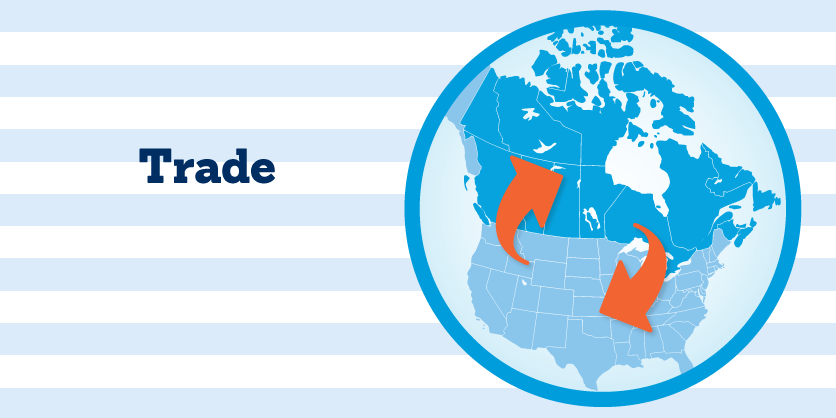
Trump says he’ll implement a 35-45 per cent tariff on Chinese imports. He plans to renegotiate the North American Free Trade Agreement (NAFTA) and bring back manufacturing jobs to the U.S.
A substantial tariff on Chinese imports could decrease trade between the world superpowers and push funds towards Canadian exports.
Conversely, U.S. businesses that import Chinese goods will incur the tariff and may pass those costs to their customers. This could decrease U.S. purchasing power for Canadian imports. Trump’s renegotiation of NAFTA could hit Canadian exports even harder, bruising manufacturing the hardest. Canadian manufacturers sent 78 per cent of their total exported goods to the U.S. in 2012. Trump’s protectionist plan to domesticate manufacturing will likely reduce that figure.
Clinton said she wants to renegotiate NAFTA to give American workers a level playing field. She’ll oppose the Trans-Pacific Partnership, and she pledges to increase domestic manufacturing in industries like steel, automobile and aircraft.
Clinton’s trade proposals likely won’t benefit Canada’s economy.
Clinton’s protectionist policies may have the same reductive effect to Canadian exports as Trump’s, especially in the manufacturing sector.
Canada has taken steps to reduce its U.S. trade exposure, decreasing exports as a percentage of total trade with the country over the last decade. The Trans-Pacific Partnership will further limit U.S. trade dependence, creating free trade opportunities with many more countries. But the U.S. is still Canada’s major trading partner, and both countries have tightly intertwined supply chains in some industries. A renegotiation of NAFTA that favours U.S. protectionist policies likely will hurt Canada’s economy.
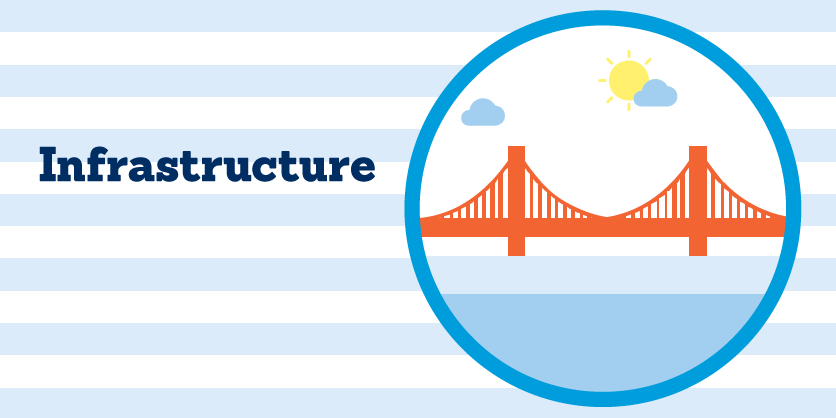
Trump has proposed spending $500 billion - $1 trillion on road, bridge, broadband and other infrastructure projects. Trump doesn’t plan to raise taxes to fund spending; rather, he says reducing wasteful expenses from over-regulation will cover costs.
A surge in infrastructure spending would likely stimulate the U.S. economy, creating jobs and increasing disposable incomes that Americans may spend on Canadian imports. Infrastructure projects could also increase demand for heavy equipment manufacturing, which could boost the Canadian manufacturing industry, if current trade agreements still exist.
Trump’s infrastructure plan likely won’t hurt the Canadian economy if he can direct wasteful expenses to afford spending. If it fails, an increase in spending without a matched increase in revenue or cost savings could increase the U.S. debt beyond its current $19 trillion deficit. Long term, this could weaken U.S. currency and decrease its purchasing power for Canadian imports.
Clinton pledged $275 billion to infrastructure over five years. She’ll fund her plan through business tax reform and direct those funds to a number of large projects including highway, transit, mechanical, air and broadband infrastructure.
Clinton’s infrastructure plan may have a positive effect on the Canadian economy. But demand for Canadian heavy equipment likely won’t match levels generated from Trump’s plan since Clinton promises to spend a fraction of what he will.
Clinton’s infrastructure plan likely won’t hurt the Canadian economy, but it could have a negative effect on Canadian imports – though lesser than Trump’s – if her plan raises U.S. debt.
Clinton’s and Trump’s infrastructure proposals could boost the Canadian manufacturing industry if trade renegotiations don’t hamper cross-border manufacturing. Long term, both candidates’ spending hikes could increase U.S. debt, weakening the country’s currency and decreasing Canadian exports.
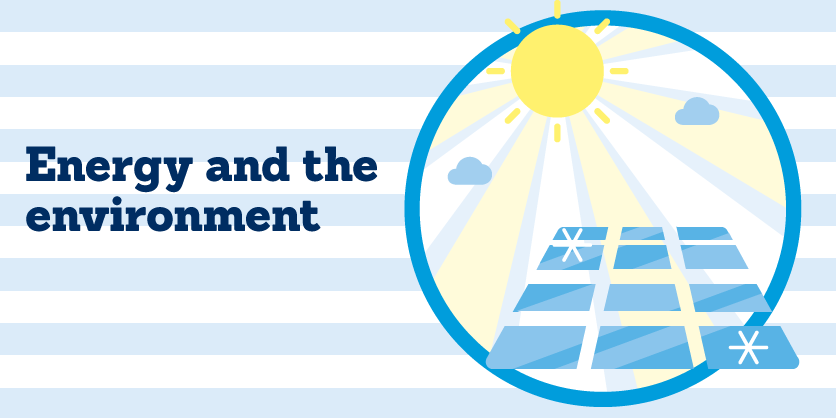
Trump proposes to drill into the U.S.’s untapped shale, oil and natural gas reserves and increase the country’s coal consumption. He also pledges to approve TransCanada’s Keystone XL Pipeline.
Increased production in the U.S. energy sector may boost the U.S. economy, consequently increasing demand for Canadian imports. The Keystone XL Pipeline will increase Canadian oil sands exports to the U.S. market, creating jobs for Alberta’s weakened oil and gas sector.
Increased natural gas and oil production in the U.S. may keep energy prices low, potentially offsetting total Canadian oil production and keeping the country’s energy sector sluggish. In the long term, more drilling and consumption of fossil fuels, especially coal, may intensify global warming’s effects.
Clinton opposes the Keystone XL Pipeline. She proposes to invest millions of dollars in renewable energy and vows to cut U.S. oil consumption by one third within 10 years of taking office.
The U.S. is the second-largest emitter of carbon dioxide in the world. Clinton’s plan to cut oil consumption by 33 per cent bodes well for the environment and may attract investment and create jobs in Canada’s renewable energy sector in the long term.
In 2016, Canadian oil exports to the U.S. hit record highs. Cutting U.S. oil consumption could decrease Canadian oil imports significantly. Axing the Keystone XL Pipeline may also harm the struggling Alberta oil and gas sector in the short term.
In the energy and environment sector, the candidates’ starkly different policies could have opposite effects on Canada and the world. Trump’s pro-fossil fuel promises could inject the Alberta oil and gas industry with life but undermine the long-term health of the environment. Clinton’s plan for clean and sustainable energy could drag Canadian oil down further, but in the long term, she could initiate a change in energy production that could inject new life into Canada’s clean energy sector and improve the overall health of the planet.
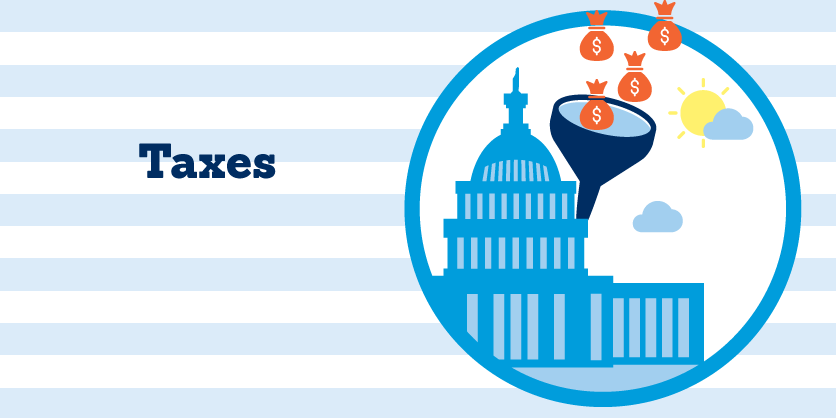
Trump proposes to reduce personal and corporate income tax. He’ll simplify the tax code and cut the highest marginal income tax rate from 36 to 33 per cent. Trump will also reduce corporate income tax from 35 to 15 per cent.
If lower taxes boost net incomes and lead to greater spending, Canadian exports may increase given the country’s significant trade relationship with the U.S. This could bring a stimulus to a number of Canadian businesses across many sectors.
Trump’s plan will decrease the U.S.’s corporate tax rate and bring it at par with Canada’s. This could increase competition between the two countries, and Canada may lose current and prospective businesses south, decreasing demand for Canadian labour.
Clinton proposes to close loopholes that enable millionaires to pay fewer taxes. She also pledges tax relief for small businesses. She’ll allow them to write off up to $1 million in new investments, doubling the current write-off, and increase the tax deduction for start-up costs from $5,000 to $20,000.
Clinton’s tax plan may entice U.S. small businesses to increase capital investment on new equipment. Given Canada’s strong manufacturing relationship with the U.S., the increased demand for capital equipment could boost Canadian imports.
Clinton effectively pledges to raise taxes for the wealthiest Americans. A higher marginal tax rate will reduce net incomes for millionaires and may reduce spending on Canadian imports, which may slightly offset equipment demand from small businesses.
Trump’s tax policy could have an adverse effect on Canada. Given the U.S.’s lower minimum wages, it might hold an advantage attracting businesses if Trump reduces the corporate tax rate. Clinton’s tax incentives could produce a net positive for Canada. U.S. small businesses account for 31 per cent of America’s import value. If additional write-offs lead to extra capital investment, Canadian exporters could see some of it.
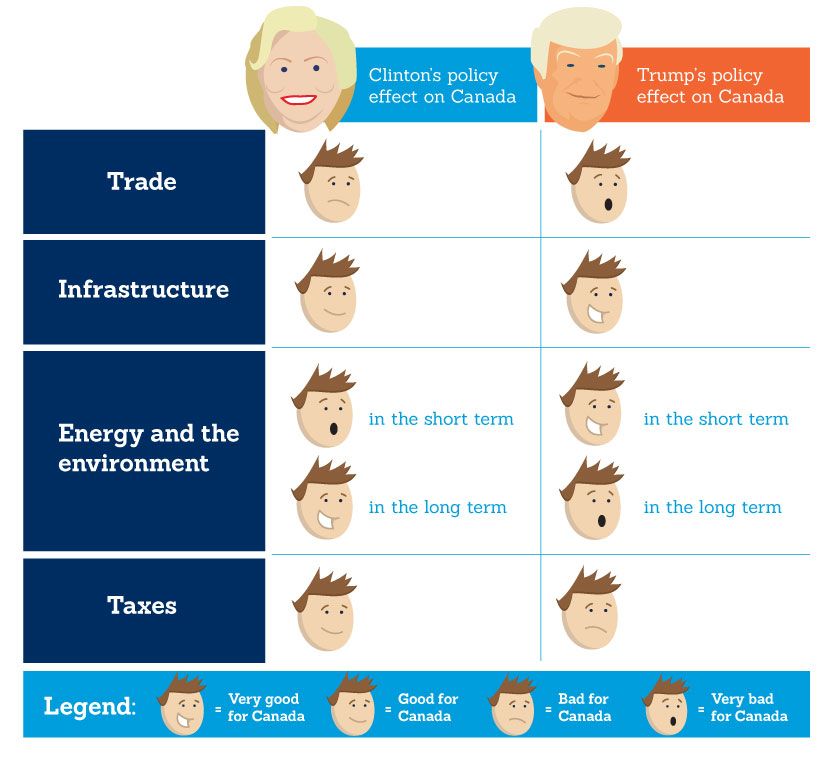
Clinton’s policies could have a more positive effect than Trump’s plans. Trump’s infrastructure and energy plans will likely help Canada in the short run, but his stance on NAFTA is worrisome. Any change that could decrease the $325 billion in goods and services exported to the U.S. annually will only hurt Canada’s economy. Although Clinton’s plan for NAFTA may not favour Canada, she takes a softer stance on the agreement’s renegotiation. Her taxes and infrastructure plans could boost the economy, and her energy and environment plan values the long-term health of the planet.
Although we can only predict what Clinton’s and Trump’s policies might mean for Canada, the better you prepare your business, the better you’ll adapt to a changing economy when the U.S. elects its 45th president. As Louis Pasteur once said, “Chance favours the prepared mind.”
Posted in General business advice,
Contact us and we'll call you right away